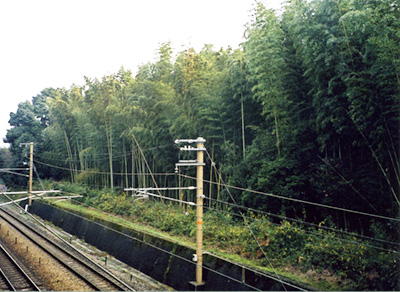
Although I remember very little about being a kid, I must have enjoyed living in Japan in fifth and sixth grades (1956–58), because it left me with a lifelong interest in things Japanese. It is often difficult to explain one’s interests to others, especially if they have never experienced what you are talking about, but trust me, Japan is amazing. Here are some particular topics which I find of interest (notice the lack of food in this list—I don’t like fish, which causes a Big Problem with Japanese cuisine). Personal names used below are in Western order.
The kings of the grasses. Useful, lovely, edible and fascinating. They will also grow in many places where one would not think of them; we had four species in Cambridge, and all flourished—in fact, at the height of the growing season, all four grew a measured 22–24 cm over various 24-hour periods. Take proper precautions against invasive behaviour (though many are not aggressive) and they will add beauty and interest to your garden. You will probably need to contact a specialist nursery in your country, as few regular nurseries carry bamboos. Be careful with names, as bamboo is notorious for species and even genus name changes over the years. The American Bamboo Society maintains a very useful list of names.
The photos below are from our trip in December 2000, to Kyōto, and were taken in the lush bamboo forest near Arashiyama, a short bus (or train) ride away.

Bamboo forest near the train tracks of Arashiyama.
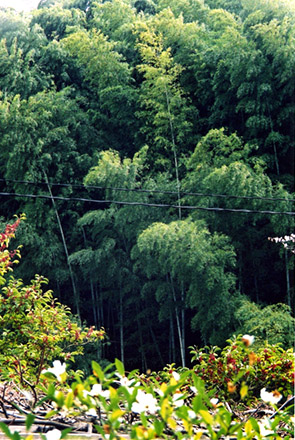
Bamboo grove climbing a hill.
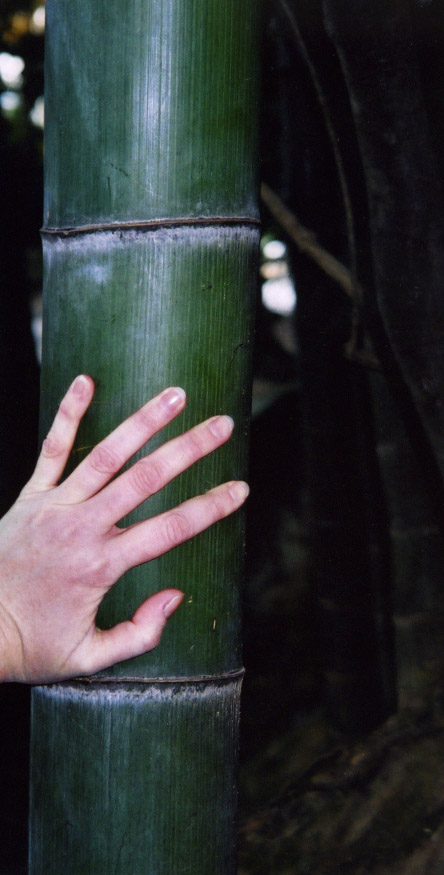
Bamboo close up.
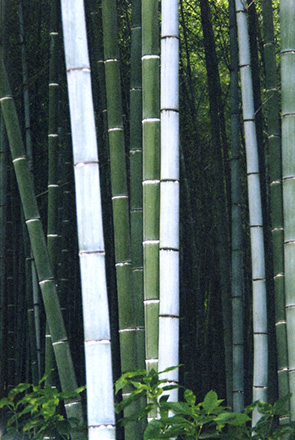
Bamboo, with cedars in the background.
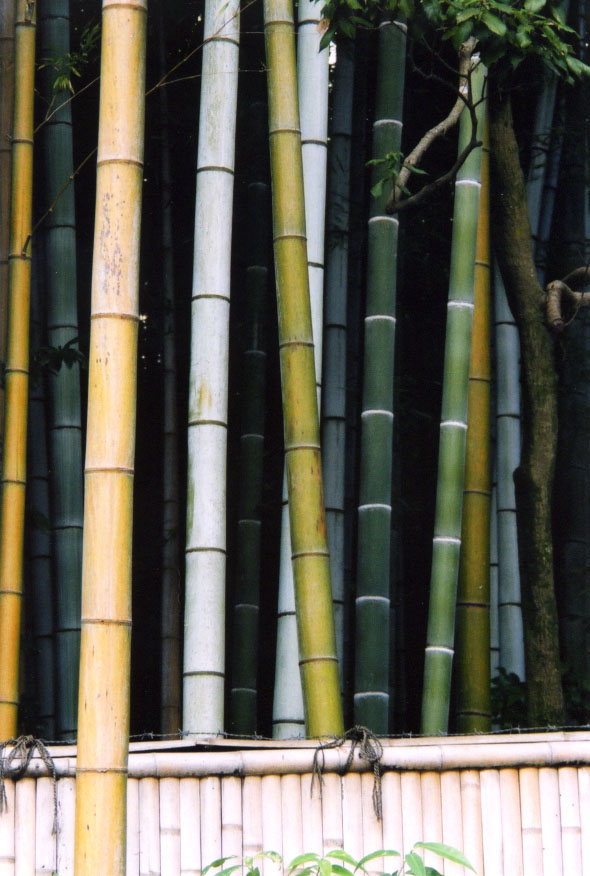
Dense grove just off a path.
From simple indigo repeated patterns to stunning kimono, Japanese textiles are the epitome of refinement and restraint (well, usually; some of the more over-the-top kimono are a bit hard on the eyes). I still remember the shock of seeing a kimono displayed in a store window of an apparently ordinary shop in Kyōto, with a price tag equivalent to over $100,000. Any book on Japanese textiles will include photos of kimono, and there are several which focus on kimono. And books about Japanese patterns will usually focus on textiles (e.g. Japanese Patterns, Pepin Press, Amsterdam 2003; Jeanne Allen, The Designer’s Guide to Samurai Patterns, Thames and Hudson 1990; Hibi, Niwa and Thomas, Snow, Wave, Pine: Traditional Patterns in Japanese Design, Kodansha International, 2001).
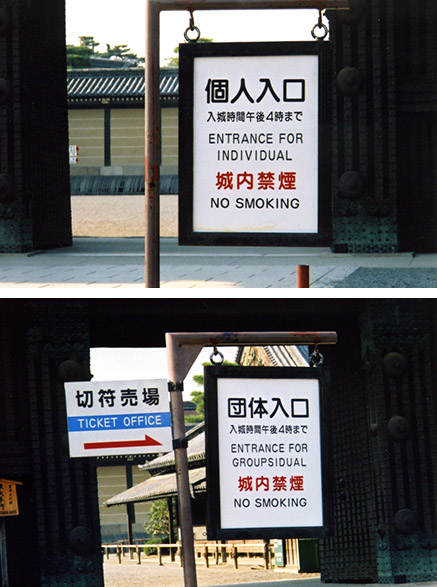
A pair of signs (actually side-by-side) in Kyōto, at the entrance to the Ninomaru Palace. It makes sense…
Toronto is fortunate to be a hotbed of kumi daiko, with a main ensemble, Nagata Shachu (and another, Yakudo, which recently folded), and several amateur ensembles as well.
My own teachers have been Kiyoshi Nagata and Aki Takahashi. Nagata-san and the eponymous Nagata Shachu offer an annual major concert, and usually have two or more free smaller concerts through the year in Toronto. They also tour extensively in the U.S. In addition to being a member of Nagata Shachu, Aki leads her own group, ten ten (with a presence on Facebook), which is “an evolving musical experiment with its roots in the Japanese folk tradition”.
Miyazaki is probably the best-known Japanese maker of animated films, in the West. Perhaps not true anime, his magical movies have redefined the emotional content of animation, and have brought many exquisitely beautiful images to the screen. I divide the ten films directed by Miyazaki that I have seen into three groups: a Top Three; a Middle Five; and a Bottom Two. These last are at the bottom only relatively: anyone would be proud to have created them, and they still bear repeated viewing.
| Category | Title | Date |
|---|---|---|
| Top three | Spirited Away Princess Mononoke My Neighbour Totoro | 2001 1997 1988 |
| Middle five | The Wind Rises Ponyo on a Cliff Howl’s Moving Castle Kiki’s Delivery Service Castle in the Sky | 2013 2008 2004 1989 1986 |
| Bottom two | Porco Rosso Nausicaä | 1992 1984 |
Disney took their time in releasing these on Blu-Ray, but all are now out in that format. Is 4K next?!
When the word ‘Japan’ is said to most people, they usually think of Tōkyo, the vibrant current capital. But to me, the more inviting city is one of the ancient capitals, Kyōto. If you decide to go there, don’t be put off by the bleak view from the train as you approach the station. The station itself (1997) is rather attractive, but the nearby cityscape is decidedly unimpressive overall. However, once you get to the local level, the city is full of stunning locations; in fact it is a UNESCO World Heritage Site because of the number of temples and shrines, and the reminders of imperial pomp and display. A major city of around 1.5 million, Kyōto has industry, movie-making, traditional crafts, universities, great museums and parks. If you go to Japan, you should go to Kyōto.

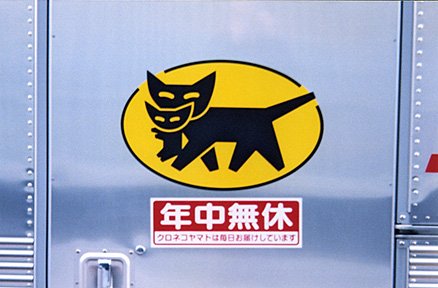
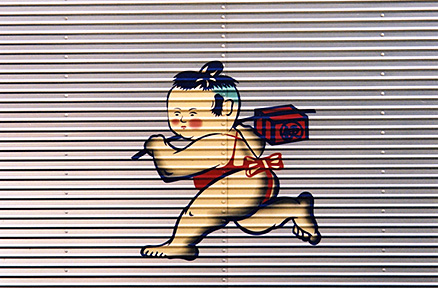
Some of the many delightful logos on the sides of the horde of small delivery trucks cruising the streets of Kyōto.